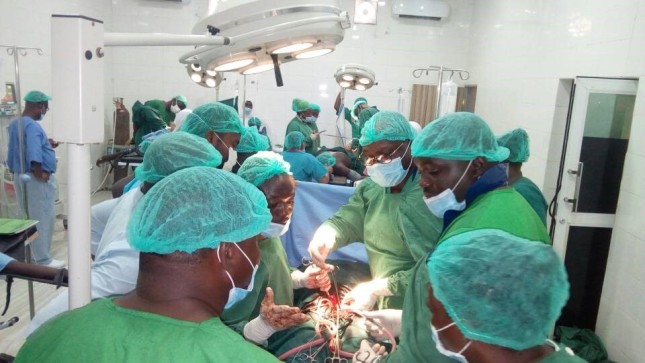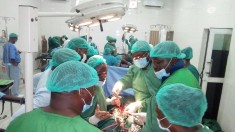-
To End Fistula by 2030, First Strengthen the Healthcare Workforce
March 4, 2020 By Vandana Tripathi When childbirth takes place without skilled birth attendants or adequate emergency obstetric care, a woman may suffer from obstetric fistula. Women with fistula live with uncontrollable urinary and/or fecal incontinence, because a hole has formed between the birth canal and bladder or rectum. They have usually survived prolonged/obstructed labor, often lost their child to stillbirth, and frequently face severe social isolation and stigma. There are also now more and more women suffering from iatrogenic fistula caused by injuries during pelvic surgery, especially obstetric or gynecological surgery. Between 1 million and 2 million women currently need fistula repair, with thousands of new cases each year. However, most fistulas can be treated, enabling women to resume healthy, productive lives in their communities. Recognizing this, the United Nations has issued a call to end fistula by 2030.
When childbirth takes place without skilled birth attendants or adequate emergency obstetric care, a woman may suffer from obstetric fistula. Women with fistula live with uncontrollable urinary and/or fecal incontinence, because a hole has formed between the birth canal and bladder or rectum. They have usually survived prolonged/obstructed labor, often lost their child to stillbirth, and frequently face severe social isolation and stigma. There are also now more and more women suffering from iatrogenic fistula caused by injuries during pelvic surgery, especially obstetric or gynecological surgery. Between 1 million and 2 million women currently need fistula repair, with thousands of new cases each year. However, most fistulas can be treated, enabling women to resume healthy, productive lives in their communities. Recognizing this, the United Nations has issued a call to end fistula by 2030.
When childbirth takes place without skilled birth attendants or adequate emergency obstetric care, a woman may suffer from obstetric fistula. Women with fistula live with uncontrollable urinary and/or fecal incontinence, because a hole has formed between the birth canal and bladder or rectum. They have usually survived prolonged/obstructed labor, often lost their child to stillbirth, and frequently face severe social isolation and stigma. There are also now more and more women suffering from iatrogenic fistula caused by injuries during pelvic surgery, especially obstetric or gynecological surgery. Between 1 million and 2 million women currently need fistula repair, with thousands of new cases each year. However, most fistulas can be treated, enabling women to resume healthy, productive lives in their communities. Recognizing this, the United Nations has issued a call to end fistula by 2030.
Ending fistula requires a multi-pronged approach: identifying and treating existing fistula cases, while preventing both obstetric and iatrogenic fistula through widespread access to adequate emergency obstetric care and voluntary family planning services, as well as community engagement for preventive behaviors and treatment access. At the heart of both prevention and treatment is a strong healthcare workforce. EngenderHealth’s fistula initiatives, including its current Fistula Care Plus (FC+) project, have trained 365 fistula surgeons and more than 30,000 health providers in countries with a fistula burden.
Surgical Safety Gaps
Between 10 percent and 40 percent of fistulas being treated at fistula treatment centers in sub-Saharan Africa and South Asia are iatrogenic—most often caused by errors during cesarean section, according to data from FC+, and other recent studies. The number of cesarean sections is expanding fast in low- and middle-income countries. But, in many settings, the health system has not been able to keep pace with this increase to ensure that cesareans are provided safely. While many women still do not receive the emergency obstetric care they need, other women are receiving cesarean sections that are not necessary—sometimes in the same country, or even the same health facility. For example, a recent review of fistula cases in Central and East Africa found that 64 percent of women with fistula who gave birth to a stillborn baby received cesarean sections, contrary to international guidelines.
To understand the issues contributing to unsafe cesarean and iatrogenic fistula and identify ways to solve these problems, FC+ held a consultation with the Maternal Health Task Force (MHTF). The underlying challenges in low-resource settings are significant. In some understaffed hospitals, obstetricians may conduct cesarean sections alone, without support from a nurse or anesthetist. At some busy referral hospitals, obstetricians provide an average of six cesarean sections a day. Reflecting these concerns, nearly half of the recommendations of the 13-point consensus action agenda resulting from the FC+/MHTF consultation involved expanding and supporting the health workforce. Examples include promoting midwifery-led labor management in all settings and encouraging obstetric educators to teach alternatives to cesareans such as assisted vaginal delivery. These actions will help to ensure that these technical skills do not disappear and will reduce the incidence of unnecessary cesarean deliveries.
The Power of Non-surgical Care
Some obstetric fistula can be prevented and treated through interventions delivered by midwives. These interventions include providing women who have experienced prolonged/obstructed labor with appropriate urinary catheterization. Catheterization can prevent fistula from developing, but it can also successfully treat a proportion of smaller, “fresh” fistulas. The government of Nigeria has released guidelines for preventing and treating fistula through catheterization, but providers, especially midwives, require training and empowerment to consistently deliver this intervention. Fistula surgeons estimate that nearly half of non-surgical fistula treatment in Nigeria is still provided at fistula treatment centers. However, if midwives are supported to provide catheterization to women immediately after prolonged/obstructed labor, many more fistulas can be prevented directly at maternity care points, and the need for surgery may be avoided in many cases.

Partnering to Strengthen Fistula Care in West Africa
Recognizing the many ways that a stronger health workforce can contribute to ending fistula, FC+ is now partnering with the West African College of Surgeons (WACS). This new partnership officially launched during the 60th WACS Annual Meeting in Abuja, Nigeria, in February 2020. FC+ and the College are collaborating to create a costed workforce development plan that supports the Economic Community of West African States (ECOWAS) to meet its Assembly of Health Ministers’ call to eliminate fistula in the region by 2030.
In Nigeria, the most populous country in the ECOWAS region, estimates suggest 200,000 women live with fistula, with many new cases annually. While many skilled providers conduct thousands of fistula surgeries each year in Nigeria, much can be done to credential, coordinate, and support their expanded and sustainable service provision through degree or certificate programs. In some smaller countries in the region, such as the Gambia, Guinea-Bissau, Liberia, and Sierra Leone, while the number of fistula cases is much smaller, few providers have the surgical skills to repair fistulas. In both settings, workforce gaps remain.
Partnerships linking academic medical centers and professional associations within the ECOWAS region can help tackle workforce development needs in both high-burden settings like Nigeria and settings where capacity building is the priority, such as the Gambia. Through this partnership, FC+ and the West African College of Surgeons are mapping regional strategies to accelerate women’s access to quality fistula care. Some of these strategies include: facilitating broader use of fistula surgery simulation training and other e-learning tools; conducting cross-national consultation visits within the region through which surgeons with advanced fistula repair skills treat complex cases while training their local colleagues; and establishing a network of academic fistula educators across the region.
Many actors in the ECOWAS region have technical resources, ideas, and programs to build the fistula care workforce. By coordinating these into a unified workforce development plan and identifying the costs of implementation, the FC+ and WACS partnership can provide a foundation for technical expertise exchange and financial resource mobilization across the region.
With appropriate resources and strong health systems for fistula prevention and treatment, a fistula-free generation can become a reality in West Africa and around the world. Training and supporting surgeons, obstetricians, anesthetists, nurses, and midwives is an essential part of the path to achieving this goal
Vandana Tripathi is the Director of the USAID-funded Fistula Care Plus project implemented by EngenderHealth.
Sources: BJOG: An International Journal of Obstetrics and Gynaecology, BMJ, Fistula Care Plus, The Guardian, UN General Assembly, USAID, WACSAbuja2020.org, West African Health Organisation.
Lead Photo Credit: Surgeons participating in surgical training in Nigeria, courtesy of FC+/Nigeria.
 A Publication of the Stimson Center.
A Publication of the Stimson Center.

 When childbirth takes place without skilled birth attendants or adequate emergency obstetric care, a woman may suffer from obstetric fistula. Women with fistula live with uncontrollable urinary and/or fecal incontinence, because a hole has formed between the birth canal and bladder or rectum. They have usually survived prolonged/obstructed labor, often lost their child to stillbirth, and frequently face severe social isolation and stigma. There are also now more and more women suffering from iatrogenic fistula caused by injuries during pelvic surgery, especially obstetric or gynecological surgery. Between 1 million and 2 million women currently need fistula repair, with thousands of new cases each year. However, most fistulas can be treated, enabling women to resume
When childbirth takes place without skilled birth attendants or adequate emergency obstetric care, a woman may suffer from obstetric fistula. Women with fistula live with uncontrollable urinary and/or fecal incontinence, because a hole has formed between the birth canal and bladder or rectum. They have usually survived prolonged/obstructed labor, often lost their child to stillbirth, and frequently face severe social isolation and stigma. There are also now more and more women suffering from iatrogenic fistula caused by injuries during pelvic surgery, especially obstetric or gynecological surgery. Between 1 million and 2 million women currently need fistula repair, with thousands of new cases each year. However, most fistulas can be treated, enabling women to resume 


